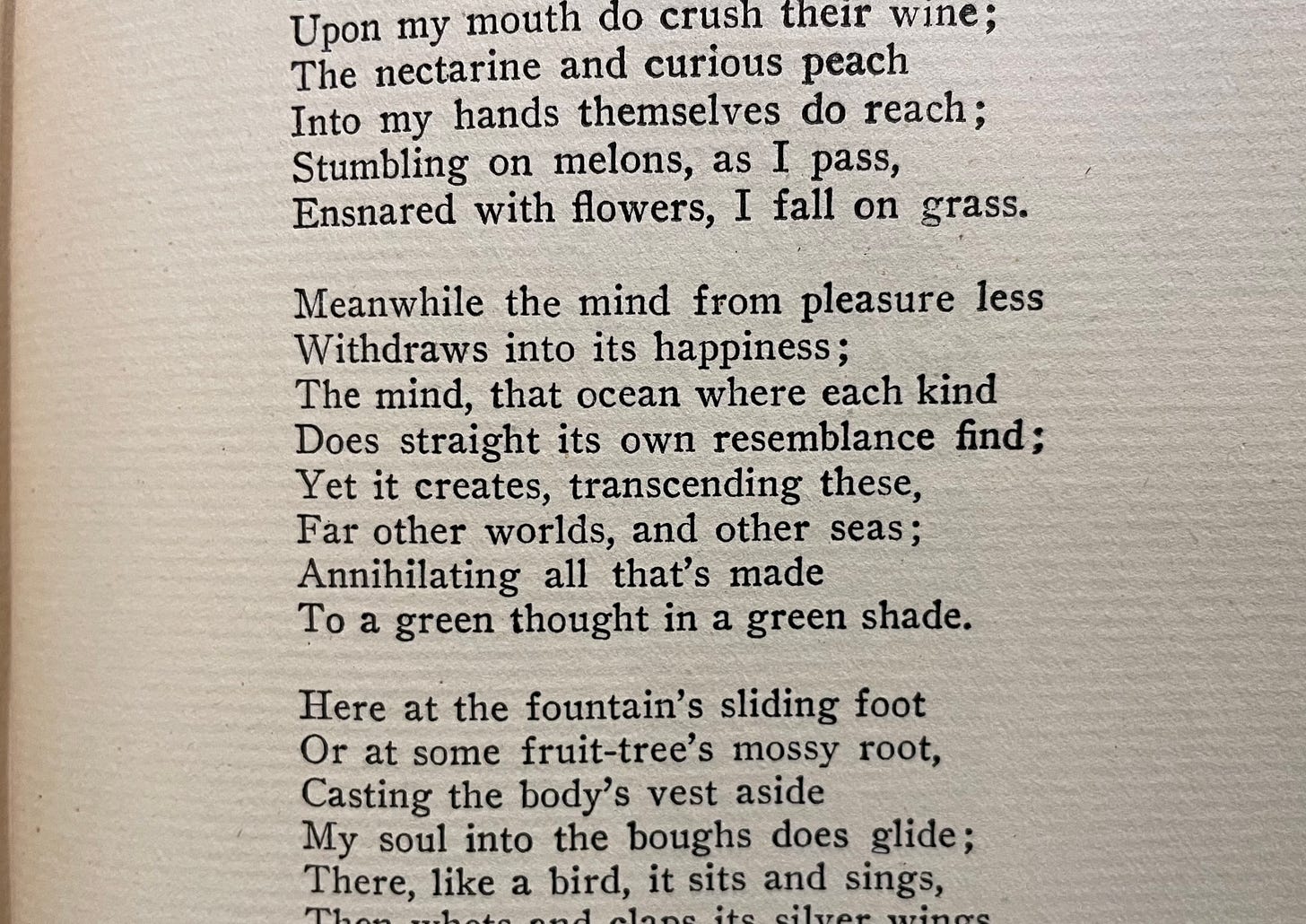What an absolute delight it was to talk with the brilliant scholar Katie Kadue about Andrew Marvell’s poem “The Garden.” I learned so much from this conversation! You can listen to the episode on Apple Podcasts, Spotify, and Google Podcasts.
“The Garden” contains one of the most memorable and strange couplets I know: “Annihilating all that’s made / To a green thought in a green shade.” That last line especially has always fascinated me, conjuring, as it does, a weirdly blissed out, apocalyptic vision of Eden.
What Katie helped me see was how the green of these lines—and the kind of reductionist fantasy they describe—depends on Marvell’s foreshortening of the misogynist myths that underwrite the foundations of European lyric poetry: present here in “The Garden” in Marvell’s allusions to the stories of Apollo and Daphne and Pan and Syrinx. In the former myth, for instance, the green laurels of lyric poetry are a kind of compensatory gift for the failed rape of Daphne, who is turned into a tree by her father in a desperate attempt to prevent her assault by the pursuing Apollo. As Katie points out, Marvell’s allusion to that myth—“Apollo hunted Daphne so / Only that she might laurel grow”—radically condenses the source material down to a single rhyming couplet, so that the laurels of lyric no longer seem a consolation prize but rather the whole point of Apollo’s assault. Marvell’s Apollo doesn’t want sex, he wants the laurels.
In Katie’s utterly persuasive account, the condensed beauty of the line that so fascinated me is the logical end of a lyric tradition with such an origin myth:
That doubling of “green” and “green” is so interesting. Because so much of the poem seems to be about resemblance, and rhyme isn’t exactly the same, a pun has two meanings that are different even though they’re contained in one word, but that doubling of “green”—green is green, it is insisting on identity more than resemblance, total identity. What seems to be, in some ways, the goal of this poem, to cut out mediation, the mediation of metaphor, the mediation of women, the mediation of business, commerce, negotium, and just get to things being what they are, without anything else in between.
More than once in this conversation, Katie describes the poem as a kind of “joke”—which, as she says, like all jokes, has something sincere at its core—by which (I think) she means that it is an absurdly exaggerated version of a desire that Marvell evidently felt but didn’t ultimately attempt as a model for life. Marvell was no recluse, for one thing. As a joke—a serious and heartfelt joke, perhaps—I take it the poem is also a revision of another poem about a garden, one written by Marvell’s good friend (a friend whose life he once saved!), John Milton. Here is how Milton’s epic garden poem, Paradise Lost, ends:
Make it to the end of our hour-long conversation, and you’ll hear Katie read these beautiful lines and brilliantly discuss how Marvell’s poem responds to their vision of companionate world and time.
Katie Kadue is the author of Domestic Georgic: Labors of Preservation from Rabelais to Milton (University of Chicago Press, 2021). She is currently a Fellow at the International Network for Comparative Humanities at Notre Dame and Princeton. She has published academic essays on Andrew Marvell, Michel de Montaigne, and misogyny and cliché in Renaissance lyric poetry, and her writing has also appeared in venues such as n+1, Gawker, Los Angeles Review of Books, and Chronicle of Higher Education. Her piece on Marvell for the University of Chicago Press blog provides an excellent brief introduction to the poet we discuss in this episode—you can find it here. Finally, make sure to follow Katie on Twitter.
Once again, you can listen to the episode on Apple Podcasts, Spotify, and Google Podcasts. I hope you’ll follow, rate, and review the show if you haven’t already. Share it with friends! It’s been such a thrill to find a community of listeners already in the early days of this project—one of the great and unexpected pleasures of my career.






